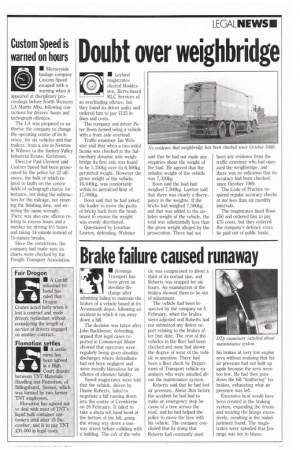Brake failure caused runaway
Page 21

If you've noticed an error in this article please click here to report it so we can fix it.
loc,0 Transport has
been given an • Jennings absolute dis charge after admitting failing to maintain the brakes of a vehicle based at its Avonmouth depot, following an accident in which it ran away down a hill.
The decision was taken after John Backhouse, defending, argued that legal cases reported in Commercial Motor showed that operators were regularly being given absolute discharges where defendants had not been negligent and were morally blameless for an offence of absolute liability.
Yeovil magistrates were told that the vehicle, driven by Duane Roberts, failed to negotiate a hill running down into the centre of Crewkerne on 28 February. It failed to take a sharp left hand bend at the bottom of the hill, going the wrong way down a oneway street before colliding with a building. The cab of the vehi
de was compressed to about a third of its normal size, and Roberts was trapped for six hours. An examination of the brakes showed them to be out of adjustment.
The vehicle had been inspected by the company on 5 February, when the brakes were adjusted and Roberts had not submitted any defect report relating to the brakes after that date. The rest of the vehicles in the fleet had been checked and none had shown the degree of wear of the vehicle in question. There had been a fleet check by Department of Transport vehicle examiners who were satisfied about the maintenance system.
Roberts said that he had lost air pressure. About 3lon before the accident he had had to make an emergency stop because of a tree across the road, and he had helped the police to move the tree with his vehicle. The company concluded that by doing that Roberts had constantly used his brakes at very low engine revs without realising that his air pressure had not built up again because the revs were too low. He had then gone down the hill "feathering" his brakes, exhausting what air pressure was left.
Excessive heat would have been created in the braking system, expanding the drums and wearing the linings excessively, resulting in the maladjustment found. The magistrates were satisfied that Jennings was not to blame.
























































































































